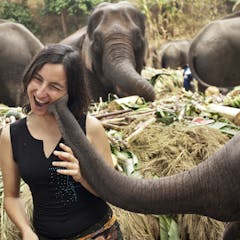
Articles sur Animals
Affichage de 1 à 20 de 411 articles

Some of the most caring animal fathers are insects.

Animals have these kinds of brain hemisphere biases too.

New study shows man made hives leak substantially more heat than the tree cavities of wild honey bees.

Many unhoused people have pets, however, accessing health care for themselves and their pets can be a challenge. ‘One Health’ clinics can provide vital health care to unhoused people and their pets.

A new algorithm could reduce the amount of time it takes for ecologists to find bat roosts.

New research documents how drones were used to track the temperatures of the Bay Islands anole lizard on the Honduran island of Utila.

Humans aren’t the only animals that have names for each other − and studying animals that use names can teach researchers more about how human names evolved.

A scientist who wanted to show pigeons don’t need intellect to navigate was surprised by nuances in his own study findings.

Giraffe necks are a hot topic among biologists. A new study contradicts an older theory that says male giraffes need long necks to fight over mates.

Find out everything you ever wanted to know about how and why chameleons change colour in The Conversation’s Curious Kids podcast.

The bigger the brain, the better we are at finding fruit. But is that true? A new study on wild primates refutes this idea.

Humans have watched and learned from animals who treat their ills with bioactive plants. This animal wisdom has a scientific name: zoopharmacognosy.

Pets’ bad behaviour can place owners under a lot of strain, research shows.

Understanding more about feathers could change the way we think about dinosaurs.

We reviewed data that purportedly showed a vegan diet was healthier and found there were more factors at play.

Philosophers have been debating whether we need conditioning to link information from different senses for centuries.

It’s a question of evolution and adaptation.

Interventions to prevent crime against wildlife can be effective, but significant gaps in our knowledge remain.

Even self-proclaimed ethical tourism programs can widen economic gaps and harm communities they claim to protect. Here are a few steps you can take as an ethical tourist.

Pets provide a source of comfort and intimacy for many owners drifting off to sleep. But according to new research, they may also disrupt your ability to fall or stay asleep.
